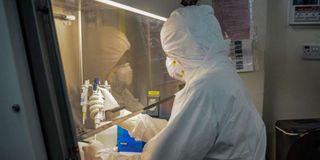Kemri yet to hire more staff to boost Covid-19 testing capacity

A researcher tests samples for Covid-19.
What you need to know:
- The money is lying at the agency’s bank account.
Currently, only 30 researchers are directly involved in Covid-19 testing.
The Kenya Medical Research Institute (Kemri) is yet to employ 65 research scientists to boost its Covid-19 testing capacity, eight months after the approval by the Public Service Board.
However, before Kemri initiates any employment process, there has to be an approval from the Ministry of Health. Despite forwarding the request in April, the agency is yet to get permission from the Ministry of Health.
According to the Kemri Director General Yeri Kombe, the National Treasury had released money to employ the staff in April and all he needs is the approval from the Ministry of Health. The money is lying at the agency’s bank account.
“We are currently operating on lean staff. Ideally, the institute should be employing 1,977 to operate optimally, we are not even 900 doing all the research, this is very low,” Kemri Director General Yeri Kombe told the Nation, this has in return affected the research at the institute.
30 researchers
The low number of technical staff with the required skills to test for the disease further hampered Kenya’s fight against Covid-19 as the country grapples with a second wave of the infections. Currently, only 30 researchers are directly involved in Covid-19 testing.
He told the Nation that he had requested the hiring of 137 research scientists and laboratory technologists but the National Treasury has only released money to hire 65 staff which is yet to be approved by the Ministry of Health.
“The money to employ the 65 [staff] has been lying in our account for close to eight months now. The Treasury is yet to allocate funds for the hiring of 74, others which the Public Service Board has approved,” Prof Kombe said.
“For us to test many samples in a day, we need the human resource which technically are the researchers and laboratory technologists, they need to be working in shifts but as it is now, they are being overworked. This might jeopardize the sample results,” Prof Kombe.
Laboratory consumables
Currently, the institute is testing at a half its capacity because of lack of enough staff, erratic supply of laboratory consumables, personal protective equipment and test tubes.
Kemri laboratories across the country are testing about 4,700 samples per day, yet it has the capacity of up to 10,000 tests per day using manual and automated systems.
Kisumu and Nairobi Kemri laboratories account for 1,500 tests per day, followed by Kemri Kericho 600 with Busia Alupe branch and Kilifi testing 500 per day. Mandera can now test 100 samples per day.
“Kemri’s testing capacity is up to 10,000 tests per day using both manual and automated systems. However, this is sometimes constrained by erratic supply of laboratory consumables and PPE’s,” the research agency told the Senate Health Committee on Friday.
In a day, the institute consumes about 700 PPEs.
“We use so many PPEs when handling samples. We also use a lot of ethanol for the specimens and test tubes, if we run out of them, then it means that the work has to stop,” he said.
““If we are able to deal with staffing shortage, PPEs problem, test tubes and the erratic supply of the consumable, then we will be able to test about 10,000 samples in a day,” he said
Cumulatively, Kenya has tested 888, 971 samples since its first recorded case in March, out of which, 83, 616 persons have turned positive.
Kemri is one of the public institutes that stopped samples collection, forcing most people to seek Covid-19 tests in private facilities. The tests cost between Sh6, 500 and Sh10, 000 depending on the hospital.
To reduce the testing cost in most of the private facilities, Dr Noelle Orata, secretary, Kenya Association of Clinical Pathologists, who also appeared before the Senate, asked the government to remove taxes charged on testing kits.
“When we suspend taxes on protective equipment, testing kits or medical devices such as ventilators, this will make it easier for the hospitals to get the medical equipment that doctors, nurses and patients desperately need,” she said.
Dr Orata also asked the government to employ more pathologists.
“We are only 150 pathologists in the country, 90 per cent of us take lead in the private sector laboratories that have the infrastructure in place to give us room to practice fully,” she said.
She urged the government to encourage telepathology to help the few pathologists to transfer pathology images and results from around the world for the purposes of diagnosis, education and research.





